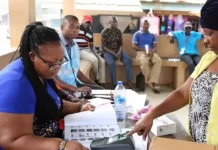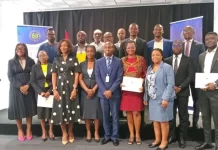
The Japan International Cooperation Agency (JICA) will be implementing the second phase of one of its flagship Projects in the Agriculture Sector in the Ashanti and Northern Regions.
The project is dubbed ‘Project for Sustainable Development of Rainfed Lowland Rice Production’.
This was made known at two separate workshops organized in Kumasi and Tamale to inform beneficiaries about the contents of the new phase of the Project.
The participants of the workshop included the Rice Liaison Officer from the Directorate of Crop Services (DCS), Ministry of Food and Agriculture (MoFA), MoFA Ashanti and Northern Regional Directors of Agriculture, staff from the two Regional Coordinating Councils and District Agriculture Departments of beneficiary districts, farmers, Project Experts and representatives from JICA.
Together with the Ministry of Food and Agriculture (MoFA), JICA implemented the first phase of the Project from 2009 to 2014 in five districts in Ashanti region and four districts in the Northern Region.
These districts include: Asante Akim North, Asante Akim Central, Atwima Mponua, Ahafo Ano North and Adansi South in the Ashanti Region.
Those in the Northern region are Tamale Metropolitan, East Gonja, West Mamprusi and Sagnerigu districts.
In a speech to highlight the successes of the first phase, Mr. Kosuke Nagino, Project Formulation Advisor at JICA Ghana Office indicated that at the end of the first phase, on the average, rice yields in the target areas doubled.
‘Invariably, the increased yields were; six tonnes per hectare from a baseline of three tonnes per hectare in the Ashanti Region and four tonnes per hectare from two tonnes per hectare in the Northern Region.
This translated into increase in farmers’ incomes and improved standards of living of beneficiary households. Thus, the Project goal of increasing the productivity and profitability of rice farming in rainfed lowland ecologies in the target areas was achieved.
Qualitatively, the Project was able to develop a Rice Extension Guideline that contains rice cultivation and extension techniques that also served as a basis for the development of beneficiary District Rice Extension Plans,’ he explained.
Mr. Kwaku Minka Fordjour, Ashanti Regional Director of Agriculture, noted that: “The Project has made an immense impact on the livelihoods of smallholder farmers in the target areas.” This was reiterated by the Northern Regional Director of Agriculture, Mr. William Boakye Acheampong at the Tamale Workshop. A farmer present at the Kumasi workshop testified that “as a result of the increase in his income level, he has been able to send his children to school and plans of acquiring a tractor to expand his farm”.
As a result of the outstanding impact of the first phase, MoFA requested JICA to extend this support to new districts within the same regions with the view of disseminating the Rice Extension Guidelines.
Accordingly, JICA agreed and will be extending these Guidelines to 20 and 15 MMDAs in the Ashanti and Northern regions respectively. The new phase will commence this year and end in 2021.
On his part, the Rice Liaison Officer representing the Director of DCS, MoFA, Mr. Al-Hassan Imoro indicated that: “MoFA is also committed to ensuring that the next phase is successfully implemented.”
Under the new phase, JICA will provide technical guidance in the dissemination of the extension guidelines to the new districts whereas MoFA will be responsible for guiding the Regional and District Agriculture Departments in the implementation of rice extension activities.
On her part, the Ministry of Local Government and Rural Development will also assist the MMDAs in mainstreaming the project activities in their planning and budgeting.
Source: ultimate1069
























